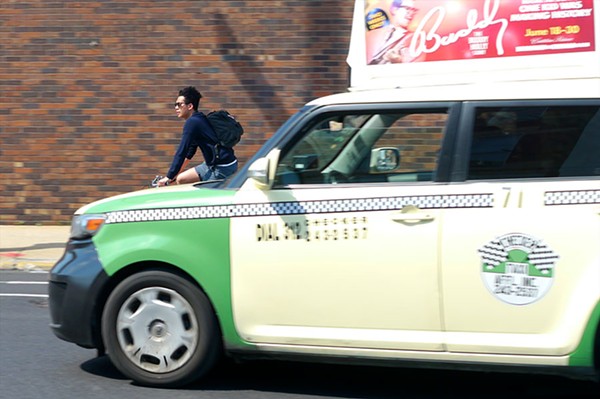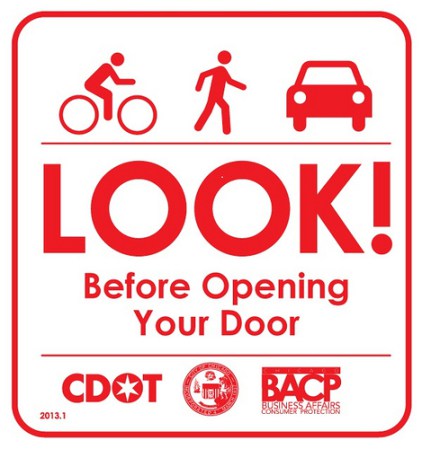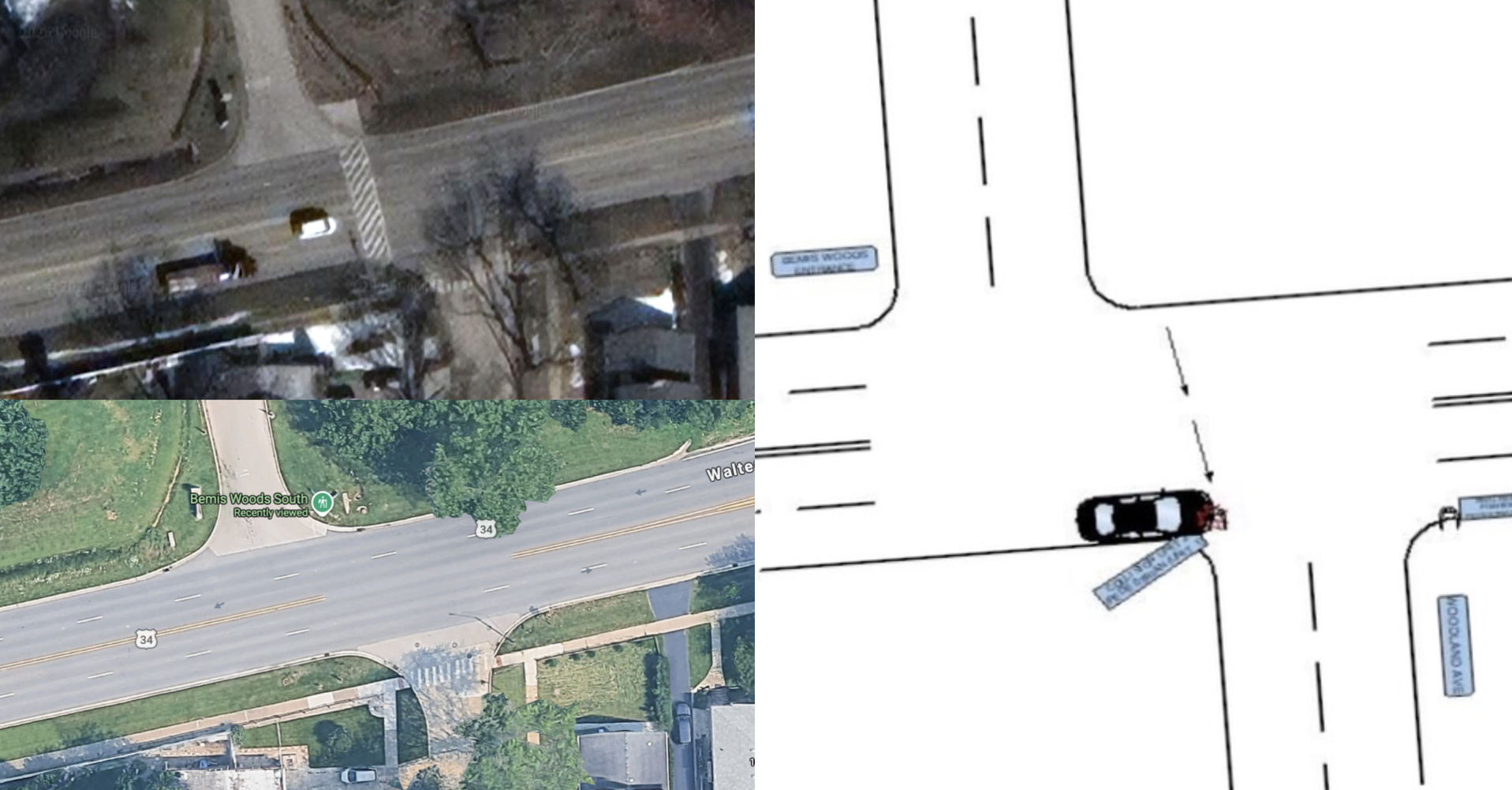[Streetsblog editor John Greenfield publishes a weekly transportation column in the Chicago Reader. We syndicate the column on Streetsblog Chicago after it comes out online.]
Taxi doorings can happen to anyone on a bike, including yours truly. About 20 years ago I was cycling southeast on Lincoln toward Fullerton, pulling up to the late, great rock club Lounge Ax for a Jesus Lizard show. A cabbie came to a sudden stop in front of me and his passenger popped open the rear right door in my path, sending me flying onto the pavement. Unbelievably, I was unhurt, but my bent front wheel resembled a Pringles potato chip. The taxi driver sped away, and when I asked the passenger who doored me for $20 to cover repairs, he sneered and disappeared into a sports bar.
In recent years Chicago has taken steps to prevent doorings, which have the potential for tragic consequences. As of 2012 the city's Public Chauffeurs Rules and Regulations, which cabbies must study in order to pass a licensing test, included the text "Chauffeurs, when discharging passengers, shall do so in a safe and legal manner. Chauffeurs shall discharge passengers curbside." That's key, because when passengers exit at the curb, rather than in the middle of the street or in a bike lane, there's no chance of them opening a door on a bike rider.
In 2013 the city doubled the fine for dooring a cyclist from $500 to $1,000, and Mayor Rahm Emanuel announced that all 7,000 of the city's cabs would be required to display "Look! Before Opening Your Door" decals, featuring symbols of a cyclist, a pedestrian, and a car.
"Taxicab drivers need to be aware of cyclists traveling near their vehicles, but their customers must also take the time to look before opening doors into traffic," Emanuel said at the time. "These stickers will remind taxi customers to be more conscious of their surroundings before they exit the vehicle."
Local design firm Minimal studios created the decals after employee Neill Townsend, 32, was fatally struck in 2012 by a semitruck driver when Townsend swerved on his bike to avoid an open car door near Walter Payton High School. Four years earlier 22-year-old art director Clinton Miceli had been killed in a similar incident three blocks southeast on the 900 block of North LaSalle. An SUV driver opened a door in the cyclist's path, and he was thrown into the street and run over by another motorist.
There were 302 bicycle dooring crashes in Chicago in 2015, the year of the most current data available from the Illinois Department of Transportation. These figures don't reveal how many of the collisions involved cabs, but that year there were 114 taxi-involved bike crashes with injuries, including 13 with incapacitating injuries, according to IDOT.
While these stats suggest that more work needs to be done to prevent doorings, including those involving taxis, last year the city took a step backward in this regard.
Recently attorney Brendan Kevenides from the bike-focused firm FK Law (a Streetsblog Chicago sponsor) was doing research on behalf of a 34-year-old male cyclist who suffered a dislocated shoulder and broken arm from a July 2015 crash. The man was doored when a taxi driver discharged a customer in a travel lane on Madison near Dearborn, immediately to the left of an under-construction Loop Link bus lane. The lawyer noticed that the latest version of the Public Chauffeur Rules, which went into effect in September 2016, omits the language requiring curbside drop-offs.

"That had been a powerful arrow in our quiver when it came to holding taxi drivers responsible when a passenger doored a bicyclist in the common circumstance of the driver letting the passenger disembark in the middle of traffic or into a bike lane," Kevenides says.
Indeed, this seems to be a widespread phenomenon. Fifteen cyclists responded to my recent query on Facebook, reporting that they'd sustained minor-to-moderate injuries while biking after a cabdriver discharged a customer somewhere other than the curb. Several of the crashes occurred on Milwaukee south of North Avenue in Wicker Park, a narrow, congested stretch where it's common for taxi drivers who are stuck in traffic to drop off passengers, blocking the bike zone.
Kevenides says he himself was doored by a cab customer at that location a few summers ago. Fortunately the front rack of his sturdy Long Haul Trucker touring bike took the brunt of the blow.
Two other cyclists said they'd been doored by passengers leaving Uber or Lyft vehicles. Chicago's current Transportation Network Driver Training Curriculum for ride-share operators notes that "passengers and driver cannot open car doors into traffic" and drivers must "pull all the way over to the curb when picking up or dropping off a passenger."
And when customers exit in the middle of the street, it can also create a hazard for other types of road users. Marketing professional Rebecca Resman says that about three years ago she was on an eastbound Belmont bus at Broadway when a cabbie let out a passenger who flung open the left rear door as the bus passed. "Scrape! The door was bent backwards and then it fell off."
Kevenides told me he was curious why the recent change to the chauffeur rules came about. "I wonder if the taxi lobby got sick of being held liable for causing injuries to bikers when a driver decided to drop someone off wherever."
Dave Kreisman, spokesman for the Chicago-based union Cab Drivers United, which represents several hundred Chicago cabbies, told me he didn't believe that was the case. "My understanding is that they changed these rules to streamline them and get rid of micromanaging."
Kreisman, who said he often bikes to work himself, argued that the requirement for curbside drop-offs is covered by remaining language in the chauffeur rules that requires cabbies to operate "in a safe and lawful manner at all times" and abide by all state driving laws. "Whether or not [the curbside drop-off] rule is in place, clearly dropping people off in the middle of the block, off-curb, is not safe."
However, Lilia Chacon, spokeswoman for the Chicago Department of Business Affairs and Consumer Protection, which regulates the taxi and ride-share industries, later confirmed that another reason for the language change was to relieve cabbies of liability for doorings. "The 2016 Public Chauffeur Rules eliminated redundancy in the previous version," she wrote via e-mail, and made "passengers responsible for what side they choose to exit."
But Kevenides, who says the change could make it harder for dooring victims to recover damages, argues that drivers who fail to discharge passengers curbside should also be held liable in these cases. "Cabbies will often blame their customers. Well, you didn't give them any choice but to exit somewhere other than the curb, so the inevitable happened."
Active Transportation Alliance director Ron Burke agrees. "All too often, taxi passengers fling car doors into the path of people on bikes. We share Brendan's concern about this change and will reach out to BACP to find out what's going on."
In the meantime, when you're a passenger in a cab or ride-share vehicle, politely insist that your driver pull up to the curb to let you off and, as the sticker says, look before you open the door. Someone's life could depend on it.





